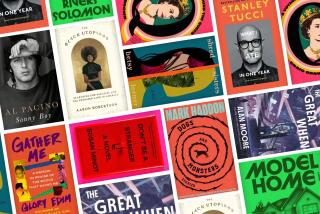Between a Brave New Literary World and a Cozy Reading Corner
- Share via
Most articles about books online concern Amazon.com and Barnes & Noble slugging it out for surfers’ book-buying dollars. But how about downloading some classics for free? Or maybe you’d like to add a paragraph to a new John Updike story? Or find an interesting author coming to a bookstore near you?
It’s all possible on the Web, where book reviews are plentiful and like-minded literati spout endless critiques in Usenet groups.
Thanks to the Gutenberg Project (www.promo.net/pg), started in 1971 by Michael Hart, thousands of public-domain texts are available to read online or download for free. Items ranging from the U.S. Constitution to “The Scarlet Letter” to Beethoven’s scores are available to peruse, with texts being added daily by volunteers around the world.
But the idea of having so much great work at your fingertips is better in theory than practice. Scholars can search for key passages without having to flip through pages, but for the average reader, wading through online text for hours can be a real eye ache. I took the time to download a collection of writings from Mark Twain, then printed out a memoir of his daughter Jean dying. Though this portable version was easier to read at leisure, a sheaf of papers doesn’t compare to a book, solid and pliable, on a shelf.
Author John Updike--he of the “Rabbit” series--has gone a step further in the interactive nature of stories with a contest at Amazon.com (www.amazon.com). Updike started a short story called “Murder Makes the Magazine” and left it to contestants to add a paragraph per day. He chooses the most interesting passage submitted, and that person wins $1,000, with a $100,000 grand-prize winner to be drawn randomly on Sept. 16. It’s now about halfway home, and the story has some intriguing twists and turns--with the suicide of a publishing tycoon at its center.
Those looking for even more experimental book forms would be wise to check out the hypertext works of Eastgate Systems (www.eastgate.com). The company sells a special Storyspace software that helps authors create nonlinear stories complete with clickable images and graphic outlines. Hypertext means that when you click on certain words or passages, you jump to a different text or footnote.
I checked out “Patchwork Girl” by Shelley Jackson, which comes on a floppy disk for Mac or PC for about $20. Jackson combines her own fiction about patchwork identities with generous excerpts from Mary Shelley’s “Frankenstein,” a jarring but effective technique that borrows and samples like the best hip-hop music. If you can suspend the need for an ending or clear plot, you’ll have hours of nonlinear reading enjoyment.
If you’re into real-world interaction with authors, visit BookWire’s “Authors on the Highway” (www.bookwire.com/highway), a searchable listing of upcoming readings and book signings nationwide. You can search by book title, author, publisher, city, state or region. The listing includes the store or cafe’s street address and phone number, but not much info on the book or author.
After a few days of reading texts online, bouncing around on hypertext and trying to write like Updike, I liked the idea of going to a bookstore, pawing through aisles of novels and hearing a harried writer read to an assembled group. Though technology offers some tantalizing alternatives, nothing beats the corner bookstore for tactile pleasures.
*
Mark Glaser is a San Francisco-based freelance writer and critic. You can reach him at McGlaze@aol.com
More to Read
Sign up for our Book Club newsletter
Get the latest news, events and more from the Los Angeles Times Book Club, and help us get L.A. reading and talking.
You may occasionally receive promotional content from the Los Angeles Times.










